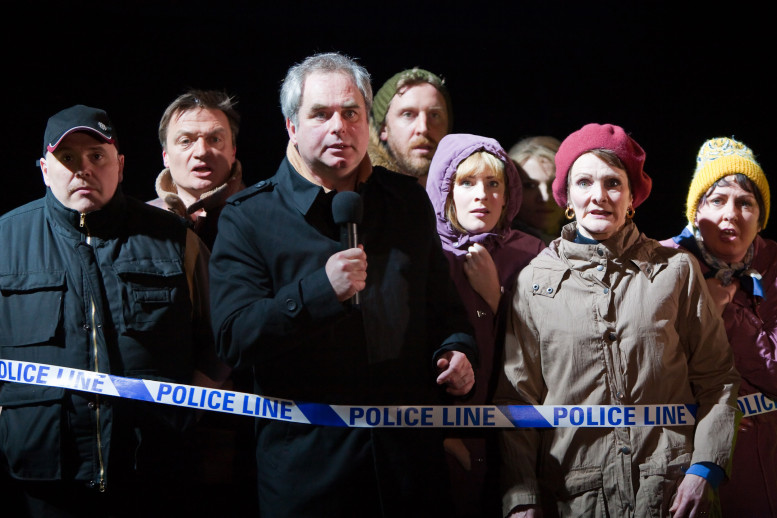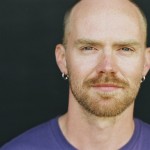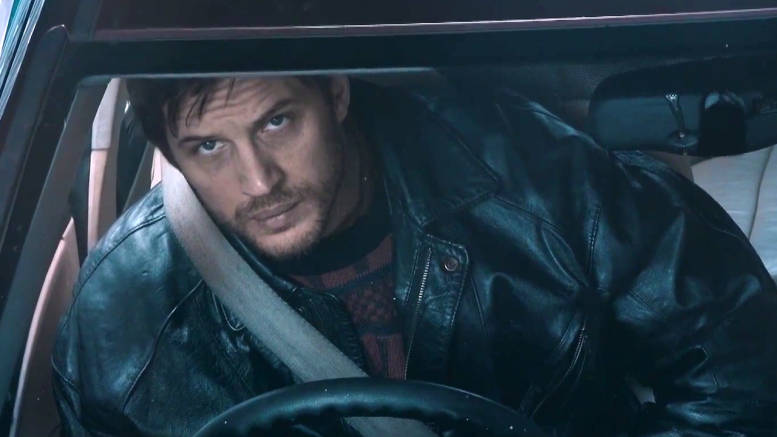The verbatim film musical “London Road,” starring Oscar-nominee Tom Hardy, premieres this week at select theaters in the United States. The show, written by Alecky Blythe (book) and Adam Cork (music), began as a stage production at the National Theatre in London. Over the next three weeks, we will publish interviews Extended Play contributors conducted with members of the creative team and cast. To find out where you can see the film, click here.
TOMMY O’MALLEY: You have built a reputation as sort of the go-to verbatim playwright, but you actually started your career as an actor. And I read that you took a workshop with Mark Wing Davey, who taught you about verbatim theater, which he had learned from Anna Deavere Smith here in the States.
ALECKY BLYTHE: That’s right, yes. I took the workshop. I didn’t quite actually realize what it involved. I got to the point in my acting career where nothing was really happening, and I was thinking about creating my own work. I’d already written a monologue that I used to use in a few auditions that went down quite well, so signing up to do that workshop came out of being in not a very good place with my acting career. I thought it was kind of more of a writing workshop that involved you actually having to write. I didn’t realize it was so interview-heavy. So that was kind of a relief. I was like, “Oh, right, I don’t even have to write anything, I just have to be sort of good at speaking to people.” I just took to it, and a few of us, off the back of that workshop, made our own group show, and each of us would go and collect interviews, we performed this little show. And then after that, I decided I wanted to do another show, and I was just a bit frustrated. Maybe I was a little bit more proactive in collecting my interviews than some of the other people that I’d done the show with before, and I felt that they were kind of holding me back. So I thought, “Well, maybe I’ll make my own piece. Then I’m not reliant on other people to get material.” So, with Mark’s blessing, I decided to go and kind of create a show with myself doing all the interviews. Purely as a tool to create my own work as an actor. I didn’t intend to, to make any more plays after that first one if it got me an acting agent, do you see what I mean?
TOMMY: So it was really a utility, to find yourself an acting agent.
ALECKY: Yeah. That was all it was.
TOMMY: So you went off and collected interviews by yourself, and the show that resulted was “Come Out Eli?”
ALECKY: Yes, “Come Out Eli,” that’s right. Eli was wanted in connection with a shooting, and he was kind of at the center of this siege.
TOMMY: What was your process like, how did you decide on this man, this case, and what was the process of collecting interviews like for you?
ALECKY: Like I said, I had already done a group show, so I’d done a few interviews before making “Come Out Eli,” and from that experience, I found that I was getting better material when the interviews were less formally organized and slightly more spontaneous. So I made a choice to make a play about the subject of fear. That’s kind of what Mark had taught, was to choose a good talking point — which I believe is what Anna Deveare Smith had done — and then get people to talk around that one subject. And you wouldn’t necessarily get a narrative, but you might get a collection of anecdotal stories all grouped together under that theme. So I decided I was going to make a play about fear, and I heard about this siege that was going on up the road, and I just thought that situation might be a good situation for me to go meet people and ask them about gun crime. I initially went off to the siege thinking I was making a play about fear, and then I collected quite a lot of material. I played some of it to Mark, and he sort of encouraged me to keep with the idea of just sticking to making a play about the siege, rather than about fear in general. I’d unwittingly walked into a story; I walked into something that actually did have a beginning, middle and end. And ever since then, that’s always what I’ve tried to do.
TOMMY: So now, rather than selecting a topic, which is something that you gleaned from Mark, who got it from Anna Deveare Smith, you actually seek out stories that are rich in drama?
ALECKY: That’s right, yes, exactly.
TOMMY: Great, so that’s a nice segue into the work you’ve done with the National Theatre in “London Road,” the stage show and now film about a town where a serial killer was targeting sex workers. I understand that were doing interviews for your play “The Girlfriend Experience,” which is set in a brothel, and some of the women you were interviewing said you should go up to Ipswich, where the murders were happening at the time.
ALECKY: Yes. With “London Road,” most of the journalists were following the main story, either trying to get stories on the girls themselves who were murdered or on Steve Wright, who carried out the murders. And when I found out that the residents who lived on “London Road,” where Steve Wright, the murderer, lived, had formed a community through the tragedies, I felt that was a side of the story that wasn’t being told.
TOMMY: When you first went to Ipswich at the behest of these women you were interviewing for “The Girlfriend Experience,” what were your expectations?
ALECKY: I did go to a couple of massage parlors because I was thinking that I would be talking to some of the women. And I did find the parlors there were seedier than what I’d kind of witnessed at the parlor where I was setting “The Girlfriend Experience.” But I think the thing that I found more interesting was, when I went into the town, I was meeting people who were living through this extraordinary time, and I was fascinated by what it was like for the local community, whose town was suddenly in the spotlight for all the wrong reasons.
TOMMY: What happened after they discovered Steve Wright was the killer and arrested him? What happened to your process?
ALECKY: I didn’t really do anymore collecting, because at that point I was capturing, what I thought I was capturing, was the fear. And I did go and talk to some people on London Road, but they were a bit tricky to talk to at that time, because they were being kind of press ganged. So I did the interviews that I could, and then I kind of thought, it’s gone quiet now… And also I didn’t really have enough for a whole show at that point, so I put it on my shelf, and then six months later — and this was before any ideas of doing a musical with it — I went to do a workshop at the National Theatre studio. I took that material, along with some other material, for me to work with. It was a kind of experimental workshop, and it was to see whether you could work with a composer, and if you came up with a potential idea for something. So I knew that I wanted to make a musical, I had decided that quite a few years ago, but I wasn’t necessarily thinking I would make one out of the Ipswich material. It was just something for us to work with. And then it just turned out that that material benefitted from music, because what I had at that time was very kind of vox-poppy interviews. If I could repeat a line, which the liberty of the song structures allowed me, then it became more powerful and more evocative of the real atmosphere that I’d experienced and was trying to recreate on stage.
TOMMY: Is that where you met Adam Cork, the “London Road” composer, in that workshop?
ALECKY: Yeah, we were paired up. There were three couples, and we don’t know why, but we were put together in a pair. I’d never met him before. He didn’t know anything about verbatim. I’m very ignorant of musicals; I just knew that I wanted to make one that maybe didn’t make me kind of cringe. I sort of go a bit queasy when it goes from speech into song, I thought, “Oh, I wonder if there’s a way of making one that isn’t cheesy.” I guess I’m just a bit of a snob, really, about musicals, even though I must admit I had a fabulous time at “Mamma Mia.” Because Adam totally took on board my detailed approach that I apply to verbatim with spoken text, we found a way — or he found a way, if you like — of listening very carefully and setting the words as they were said to music, the natural music in the way that they were delivered. And I thought, “Okay, if he can turn this into a song, and it still works as well as I know it would work as a scene, then maybe we can work together.”
TOMMY: So all of the songs, all of the lyrics, are lifted from the interviews that you conducted? Was anything invented?
ALECKY: Things were invented in terms of, in the film more things were taken out of context and put into new context. So, for example, the scene where the taxi driver played by Tom Hardy sings to the resident Sue, played by Clare Burt, who he thinks the serial killer might be, that never happened. That character that Tom Hardy plays was actually a barman in a pub. And in the show, we staged it much closer to how it happened in life. But the film, one of the challenges was trying to make the residents the center of the action all the time so that you emotionally had a stronger connection to them. And so we kind of took that character and made him a cab driver, do you see what I mean? And then I cut the other characters from the scene and chose a resident who had been the most emotionally affected by the whole thing and placed her in the cab and took lines of hers that she said to me about something else. So they are her real lines and her real delivery, but it wasn’t in response to the taxi driver.

TOMMY: I see, so what are some of the other ways in which the film departs from or complements the original stage show?
ALECKY: I would say the stage show is one maybe degree from reality, and then the film is more degrees from reality, because of the requirements of the medium and it needing to be more active.
TOMMY: I know that, generally speaking, you employ a very rigid approach to verbatim theater, whereby you have the actors listen to your interview recordings and mimic exactly what the original speaker’s intonations, rhythms, colloquialisms and pauses were.
ALECKY: Yes.
TOMMY: Was that true of the stage show, and is it true of the film?
ALECKY: Yes. I mean it was harder to implement in the film, because of course in film they try to put as much money onscreen as possible, and they don’t traditionally give you much time for rehearsal. So I had to kind of fight to have sessions with the actors to teach them because there were new actors brought on board for the film. And I was very, like you said, protective of still using the same technique. And I managed to do that. I taught the film actors the technique that I use in the theater work… Adam had written the songs by being faithful to the original delivery, so you can’t then in the spoken sections just have the actors doing their own thing; then you’ll have two different styles. That was a challenge for me to kind of get that past the producers and for the some of the newer actors to take that on board, but I think they all bought into it, having seen the other actors who’d been in the stage show and how it worked in performance. I think they saw the value in it. I was lucky enough to get rehearsals with all the actors in the end, which I know is almost unheard of for writers. So the producers totally got on board with the unusual nature of the film and what that meant in terms of production, in order to preserve the idiosyncrasies.
TOMMY:, I imagine there would be some resistance to a writer who tries to impose essentially directorial choices on a piece. What was the collaboration with Rufus Norris, who directed both the original National production and the film?
ALECKY: I mean Rufus knew that that was the way that I worked when he was brought into the project. Rufus was brought on quite late, in terms of the stage show. Adam and I had been working on it for four years, and I think Rufus was brought on six months before it got produced. So when Nick Hytner, who was then the artistic director of the National at the time, said that Rufus was going to direct it, I said, “Well that’s great. I know he’s brilliant, but I know he hasn’t seen any of my work, and I’m concerned — will he sign up to the way that I work, to my technique?” Also, Nick had said that he didn’t want the earphones to be worn for the spoken sections, and “London Road” is the first show of mine where earphones haven’t been worn in performance… That’s the way I learned it, and it wasn’t up until Nick Hytner saying, “If you want to do this show at the National, you’ve got to lose the earphones,” that I had to make the decision whether we were going to work in that way. Adam and I decided that the National was probably the only theater in the country that had the resources to pull this show off, so we thought, “Well, we’ll make a gamble.” I was very clear with Rufus of how I worked and that, if we were going to do it without the earphones, then we needed to find some way around me being happy with the original delivery because I didn’t want the actors to be doing it their own way. So before we got into the room, we already had a plan. We had six weeks of rehearsals, and the first three weeks, they worked with earphones, and then the second three weeks, the earphones came off.
TOMMY: So I’m curious, was there a liberation for you in this process of getting rid of the earphones?
ALECKY: Yes, there was. I think one of the good things with “London Road” is, because the cast actually were such good singers, they were very adept at being able to learn the lines as if it was almost a score, so they were incredible at it. But, yeah, it’s made me kind of think, “Oh gosh, the earphones.” Yes, of course, they’re important, and the audio is paramount, but ultimately I think I’m kind of keen to leave them behind now.
TOMMY: Now as far as I can tell, there have been verbatim films, there have been verbatim musicals and there have been many movie musicals. But I can’t find another verbatim movie musical, do you know of any?
ALECKY: No, we don’t know of any.
TOMMY: So you really are breaking ground here. Do you think that this is a form that lends itself well to film?
ALECKY: I think it does. Because film requires so much story, I think the challenge is to find a story that can expand and live over an hour and a half, with enough story development, if you see what I mean. I think “London Road” hopefully proves that it can. I’ve got other ideas and projects bubbling away, but how often is it that you find a kind of extraordinary, unusual story like that, that maybe has such big, universal themes? “London Road,” yes, okay, it’s about a town in Suffolk that I’m sure few people in the States have heard about, but it’s a universal story of community coming together through an awful event and healing itself and finding some redemption. People from across the world can relate to that, maybe, in some way. Some awful thing might’ve happened in a town near them. So I think that’s the challenge. I think it comes down to the story, really.
 Alecky Blythe is a playwright and actress. In 2003, she set up Recorded Delivery, a verbatim theater company, creating and appearing in her own work. Her first show “Come Out Eli” at the Arcola transferred to BAC and won the Time Out Award for Best Production on the Fringe 2004. As a writer, she has gone on to make “Strawberry Fields” (Pentabus, National Tour), “A Man in a Box” (Channel 4), “I Only Came Here for Six Months” (British Council, Brussels), “The Girlfriend Experience” (Royal Court, The Drum and Young Vic), “Do We Look Like Refugees?!” (Rustaveli Theatre, Georgia and The Assembly Rooms, Edinburgh Fringe First Award 2010). “Where Have I Been All My Life?” (New Vic), “The Riots: In Their Own Words, The Rioters” (BBC2) and “London Road” (National Theatre, Cottesloe and Olivier revival, Critics Circle Theatre Award 2011 for Best Musical.) “London Road” has been adapted for film. She is working on a new commission for the National and The Almeida.
Alecky Blythe is a playwright and actress. In 2003, she set up Recorded Delivery, a verbatim theater company, creating and appearing in her own work. Her first show “Come Out Eli” at the Arcola transferred to BAC and won the Time Out Award for Best Production on the Fringe 2004. As a writer, she has gone on to make “Strawberry Fields” (Pentabus, National Tour), “A Man in a Box” (Channel 4), “I Only Came Here for Six Months” (British Council, Brussels), “The Girlfriend Experience” (Royal Court, The Drum and Young Vic), “Do We Look Like Refugees?!” (Rustaveli Theatre, Georgia and The Assembly Rooms, Edinburgh Fringe First Award 2010). “Where Have I Been All My Life?” (New Vic), “The Riots: In Their Own Words, The Rioters” (BBC2) and “London Road” (National Theatre, Cottesloe and Olivier revival, Critics Circle Theatre Award 2011 for Best Musical.) “London Road” has been adapted for film. She is working on a new commission for the National and The Almeida.
Author
-

Tommy O'Malley is a Brooklyn-based writer and performer. He is a former Artistic Associate at the Civilians. He produces the storytelling show Big City Stories in Brooklyn and Manhattan. He regularly appears on the podcast "Race Wars," hosted by Kurt Metzger and Sherrod Small, and co-hosts its spin-off podcast "Unhireable" with comic Keren Margolis.
View all posts









